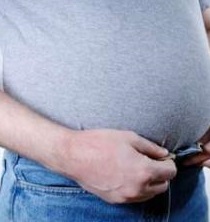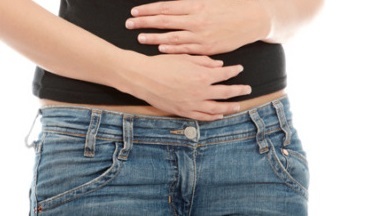 A large percentage of people are faced with such a problem as bloating. Most often this symptom occurs in people after thirty years of age or in pregnant women. Sometimes it indicates the occurrence of any disease or pathology of internal organs.
A large percentage of people are faced with such a problem as bloating. Most often this symptom occurs in people after thirty years of age or in pregnant women. Sometimes it indicates the occurrence of any disease or pathology of internal organs.
The scientific name of this is quite unpleasant, but a common phenomenon is flatulence. This phenomenon occurs in the fact that a large amount of gases, liquids and solids accumulate in the intestine, which lead to swelling. In principle, the phenomenon is quite common, but if it leads to unpleasant or even painful sensations, then it is possible to talk about problems in the body.
In this article we will talk about bloating in adults, consider the main causes of this unpleasant symptom, as well as effective ways of treatment at home.
Causes of bloating in adults
Bloating, the causes of which we will try to find out now, can be permanent or arising from time to time. Constant increase in volume, as a rule, speaks about diseases of the abdominal cavity, for example, enlargement of organs, swelling, fluid accumulation, obesity. Periodic swelling is caused by a digestive disorder, and can also be accompanied by a buildup of fluid or gases. The constant bloating differs from the periodic in that it does not go through a long period of time.
The causes of bloating can be very different: from excessive entrainment of carbonated drinks and foods with a high fat content to the presence of a serious disease. You should consider the most common:
- If in the dietThere are always products that contain a lot of fiber, the body produces gases. Carbohydrates are easily digested and start the fermentation process, which results in heaviness and swelling. Therefore, you need to be careful with the use of legumes, apples, eggs, black bread and kvass, and cabbage.
- Bloating after eating. By eating, a person swallows some air in the process. With a rush, quick snacks, someone who likes to talk while eating, the stomach is filled with air much more than it should. This leads to a feeling of a crowded gastrointestinal tract. Gases can cause nausea, sharp, short-term pain.
- Too much food. This is one of the main causes of bloating and occurs when too much food is eaten at a time. Too much salt, foods high in salt, such as chips, can cause flatulence. Foods high in sodium make the body hold water and lead to bloating.
- Irritable stomach syndrome. If the motility of the intestine is disrupted, and its movements become not aligned and chaotic, then this disease occurs. The intestine can, it looks, quite normal. A person suffering from such a disease experiences frequent pains, there are periodic desires to the chair or in front of the constipation.
- Very often we can observe bloating in colitis, chronic pancreatitis, enteritis, gastritis. Thus, you can even sometimes diagnose yourself with the presence of certain diseases. For example, if the stomach is swelling just after you have taken food, you can be sure that there is gastritis or pancreatitis.
- Intestinal dysbiosis is the cause of increased formation of gases in the large intestine. In the large intestine, microbes are normally contained, they are useful for us, since they protect our body from other, harmful microbes. When the protective properties of the body fall, foreign microbes appear in the intestine with their own ways of digesting food (decay and fermentation), which is accompanied by the formation of a large amount of gas, often with a fetid odor, since such gases include methane, hydrogen sulphide and ammonia.
- Also, quite often, bloating is observedduring pregnancy. In the early stages, this may be due to the increased content of progesterone in the body, which provokes not only relaxation of the musculature of the uterus, but also reduces the motor function of the intestine and stomach. In the third trimester, a significant increase in the uterus can lead to this.
- The causes may also be congenital insufficiency of digestive enzymes, malnutrition, diseases of the gastrointestinal tract.
- Constipation. Typically, this happens when you have a low intake of fiber in your diet, or you do not drink enough fluids to relieve regular stools.
In addition to all of the above diseases, bloating can be caused by such ailments as obstruction of the urinary tract, diverticulitis, appendicitis, ulcers and cholelithiasis.
Causes of permanent bloating
If you consider the reasons for the constant abdominal distention in patients, then almost always they are hidden in their diseases. So, this symptom is affected by people, if they have a disease:
- cirrhosis of the liver;
- peritonitis;
- pancreatitis;
- dysbiosis;
- hepatoma.
If we consider provoking factors for healthy people, then we can distinguish:
- improper consumption of food, ingestion in large portions with poor chewing;
- consumption of foods with a high content of starch;
- addiction to sweet and flour;
- consumption of soda.
As happens with the accompanying symptoms, you can get rid of the increased gas formation by completely curing the underlying disease, or by adjusting your diet.
Symptoms
When bloating, a person develops characteristic symptoms:
- feeling of bursting and heaviness;
- aching pains or colic in various parts of the abdomen.
Intestinal colic passes, as a rule, after the gases escape. In addition, in the presence of a large number of gases in the intestine may appear nausea, constipation or diarrhea, an unpleasant taste in the mouth, a violation of appetite, belching, bad breath.
Consult your doctor ifbloating is accompanied by such problems:
- Severe, prolonged or recurrent abdominal pain.
- Nausea and vomiting.
- Blood in the stool.
- Loss of body weight.
- Temperature increase.
- Chest pain.
It is worth knowing that with prolonged digestive disorders, accompanied by increased gas production, there are signs of intoxication - general weakness, insomnia, malaise, irritability, depression, headaches, heart rhythm disturbances, dyspnea and so on.
Diagnostics
Before determining how to treat bloating, it is worth to go through the examination and determine the reasons for its occurrence. First of all, attention should be paid to the diet and the regime of food intake. This will help determine which products could lead to increased gas production.
Then the attending physician will give direction to:
- analysis of feces for intestinal microflora;
- examination of bile;
- research of gastric juice;
- bacterial stool analysis;
- ultrasound examination of the digestive organs.
Depending on the findings of diagnosis, as well as the severity of symptoms of flatulence, a treatment regimen is determined.
Treatment of bloating
As for any disease, the primary consideration in the treatment of bloating is the elimination of the cause that causes increased gas formation:
- correction of power;
- treatment of the underlying disease;
- restoration of motor function (by prescribing prokinetics);
- treatment of violations of the balance of intestinal microflora (probiotics, biologics, phytotherapy);
- removal of accumulated gases from the intestinal lumen.
At home, you should normalize your diet. Exclude from the diet products that in the process of digestion secrete a large number of gases. This cabbage, legumes, rice, whole milk. Regularly eat bread from coarse grains, sour-milk products, fresh vegetables and fruits.
Begin to do daily exercises and take yourself for a rule to walk at least 3 km per day. If you do not have any serious internal diseases, then this program will definitely help you to get rid of bloating.
Treatment of bloating caused by intestinal dysbacteriosis, gastritis, peptic ulcer or enterocolitis is reduced to the treatment of the disease itself, which initiates flatulence. With flatulence, which is a consequence of chronic pancreatitis, i.e. lack of enzymes of the pancreas, are treated with drugs containing these enzymes.
Pills
Modern pharmacology offers such pills for the treatment of bloating at home:
- Activated carbon, released in the form of tablets. With flatulence, this medicine is taken on the eve of a meal for 1 to 3 pcs. Children under 7 years of age receive 1 to 2 tablets. They are washed down with ordinary boiled water;
- Espumizanand other preparations based on simethicone. Take Espumizane in the form of capsules or emulsions, two to three times a day during meals, sometimes it is recommended to take this drug additionally before bedtime. Espumizan can also be used to remove episodic accumulation of gases in the intestines, which occurred due to a violation of diet, during the post-operative period or with constipation.
- Composition of tablets against bloating under the name"White coal"based on dietary fiber. As they swell, they absorb a lot of toxins and gases. Take them before meals for 1 - 2 pcs.
It should be borne in mind that the above intestinal adsorbents are preparations with surface activity that can collect gases, but they will not solve the main cause of flatulence. Therefore, such tablets can be used only with symptomatic treatment, in the case of diet disorders: with overeating, poisoning, the use of dairy products with lactose deficiency. These situations are not chronic, and flatulence is just an unpleasant symptom easily removed by a pill against bloating.
Folk remedies
Helpfully cope with bloating such folk recipes:
- Decoction of parsley- 20 grams of the plant's fruit pour 1 t of warm water, hold for about 30 minutes, cool. Strain and use 1 st l 4-5 times a day;
- Dill water- 1 tbsp dried dill seeds pour 1 tbsp boiling water, leave for 1-2 hours, strain and take 1/4 cup 2-3 times a day;
- Decoction of wormwood- 1 h l dry grass pour 1 cup of boiling water, insist 30 minutes, strain, cool and take 1 tbsp 3 times daily before meals.
If the swelling is not caused by a wrong diet, but is a consequence of some disease, then the very cause of flatulence should be treated, after consulting a doctor.

How to choose probiotics for the intestine: a list of drugs.

Effective and inexpensive cough syrups for children and adults.

Modern non-steroidal anti-inflammatory drugs.

Review of tablets from the increased pressure of the new generation.
 Antiviral drugs are inexpensive and effective.
Antiviral drugs are inexpensive and effective.



